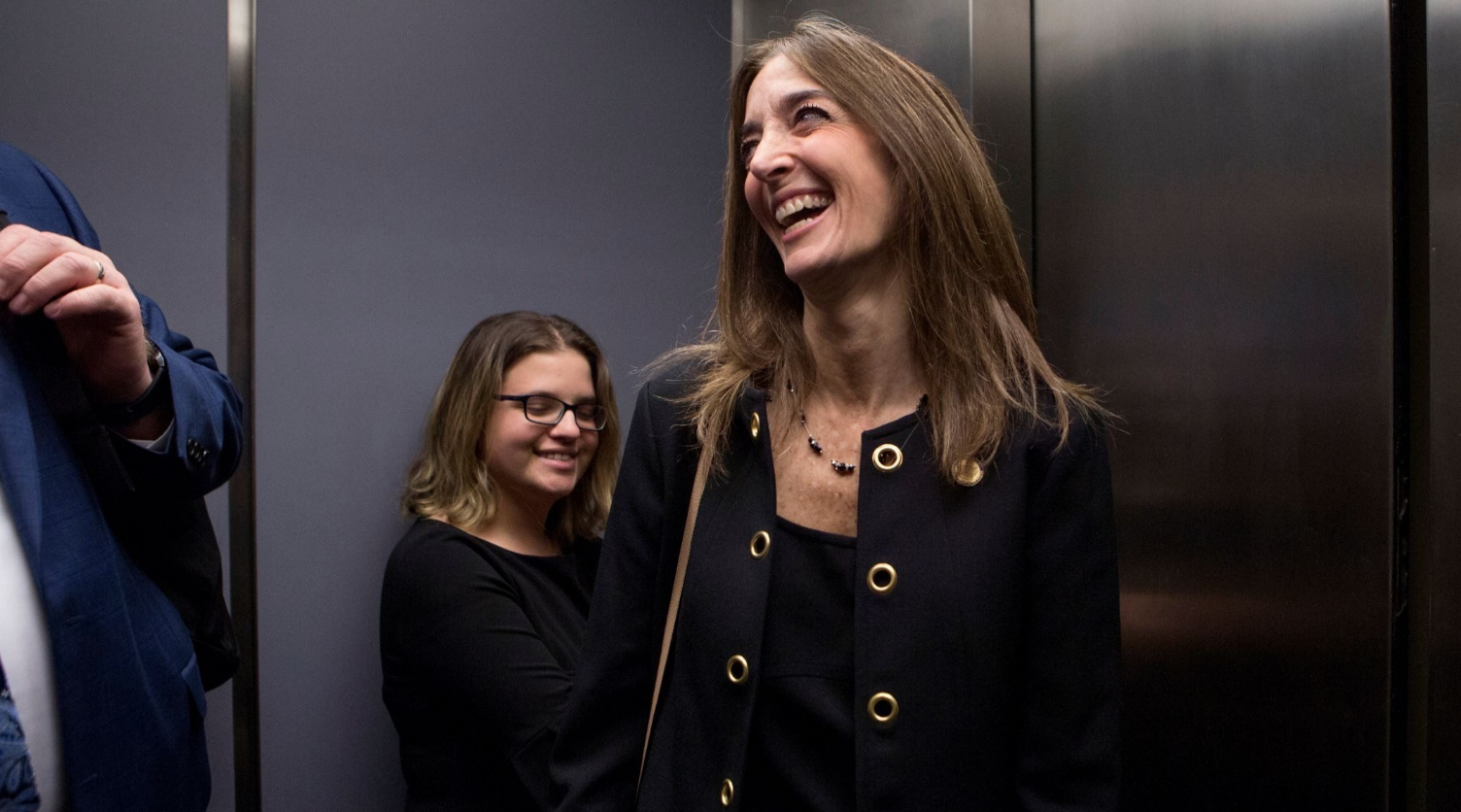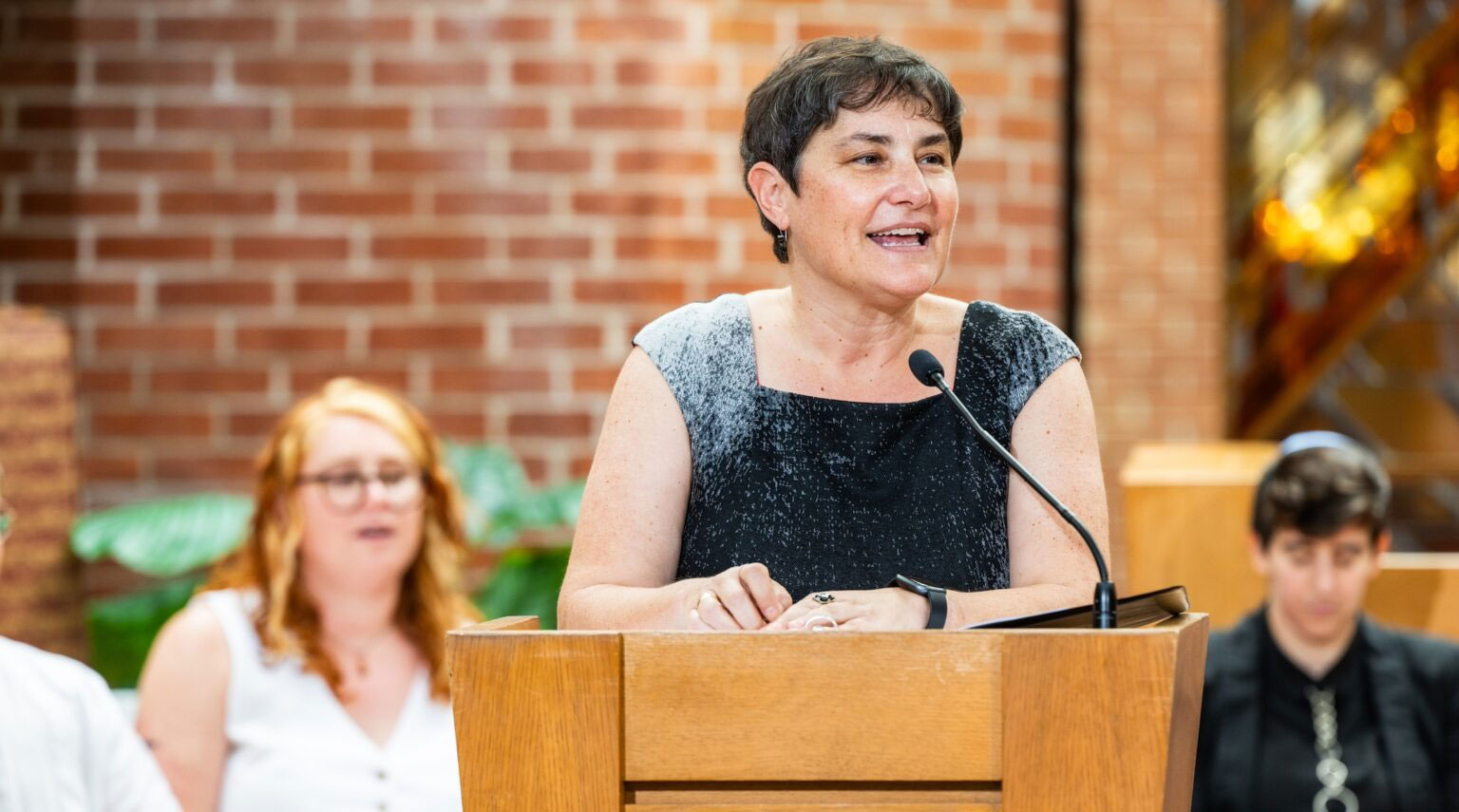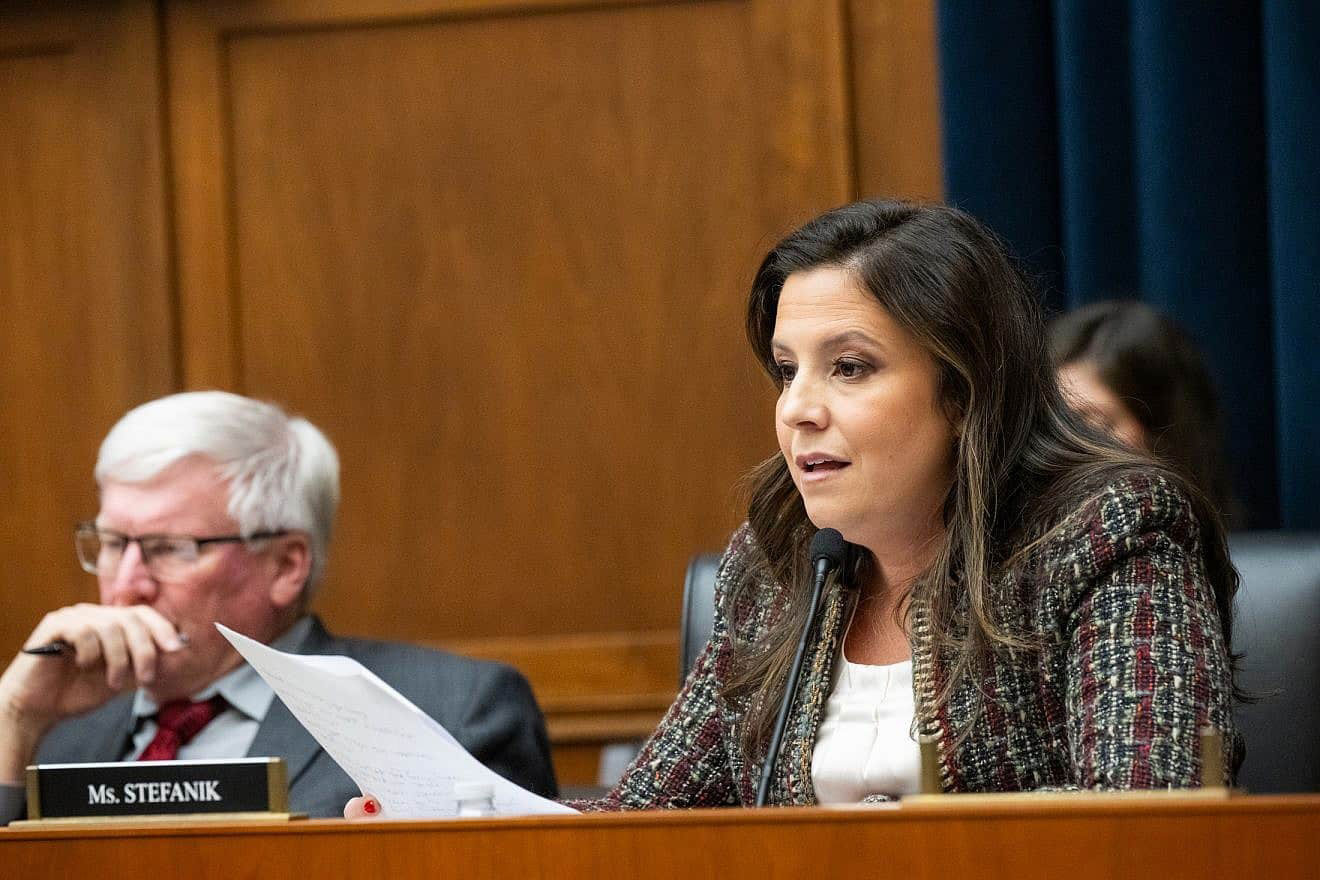(JTA) — Eileen Filler-Corn was the first Jewish speaker of the Virginia House of Delegates. State lawmaker Dan Helmer is the son of an Israeli father and the descendant of Holocaust survivors.
Now they’re running against each other in a Democratic congressional primary, and each is making Jewish identity a central piece of their pitch.
The June 18 primary in Northern Virginia’s 10th District, encompassing suburbs and exurbs of the nation’s capital, is a sign of how the local Jewish population has burgeoned. There was a time not too long ago, local Jewish leaders said, when the southern state was something of a Jewish backwater — as well as the headquarters of the American Nazi Party.
“Twenty years ago, when the JCRC would do its Advocacy Day, we would have like, four cars going up to Richmond,” recalled Ronald Halber, the longtime executive director of the Jewish Community Relations Council of Greater Washington. “And today we have buses — buses! The growth in Northern Virginia has been exponential.”
In addition to the invocations of Jewish identity in the race, pro-Israel money has poured into Filler-Corn’s campaign. Her backers cite her leadership in passing into law a popular yet contentious definition of antisemitism, a bill that Helmer opposed. In public appearances, both have been vocal in backing Israel in its war with Hamas.
It’s not the first time more than one Jewish candidate has featured in an election in the district — Helmer and Alison Friedman, a former State Department senior staffer, were part of the crowded 2018 run in which now-Rep. Jennifer Wexton emerged as a winner. She is retiring after this term because of illness.
But this year, Filler-Corn and Helmer are among the leading candidates. And both have leaned into their Jewish bona fides.
“As the grandson of Holocaust survivors, my family knows that democracy is fragile,” said Helmer, a West Point graduate and a veteran of the Afghanistan and Iraq wars, in a Jewish Democratic Council of America Zoom forum held last week. “I didn’t know until I was a teenager that the seder liturgy didn’t actually end with ‘God bless America.’” (The anecdote is not just for Jewish audiences; the same story tops his campaign bio.)
Filler-Corn invoked a Jewish idea, tikkun olam, or repairing the world, that has become commonplace among Jewish Democrats. “Tikkun olam is the guiding principle in my life, my family and my politics, and it’s a big part of why I’m running for Congress,” she said. “I believe our world and our nation and its democracy needs repair.”
Asked why they have been upfront with their Jewish identities while campaigning, both Helmer and Filler-Corn identified a factor darker than the pride they express in their heritage: personal experience with antisemitism.
In 2020, the FBI arrested neo-Nazis who considered assassinating Filler-Corn. “There are literally white nationalists in federal prison today for plotting to assassinate me,” she said in an interview. “And then a few weeks ago, images of my campaign literature were defaced. They drew horns and a Hitler-like mustache and blood coming from my mouth.”
Helmer’s Republican opponent in 2019 distributed a poster of Helmer rubbing his hand over a pile of gold coins. “This is sadly, part of being in politics,” he said in the interview. “And it is awful that an extreme MAGA movement normalized a set of antisemitic and, at times, racist tropes.”
But the Jewish references on the campaign trail also reflect a changing voter base. A 2018 population survey surprised local Jewish officials when it reported that Washington’s northern Virginia suburbs had a greater number of Jews than Maryland’s, where much of the Jewish community had long been centered.
Government work, an explosion of the tech sector, new housing developments and well-regarded schools appear to have drawn Jews from around the country to Virginia. Helmer and Filler-Corn both moved to the area from New Jersey.
Kyle Kondik, the managing editor of Sabato’s Crystal Ball, a nonpartisan elections newsletter out of the University of Virginia, said the district had shifted from Republican to Democrat.
The district “is a poster child for the kinds of shifts that we’ve seen in favor of Democrats” in Virginia, he said. “You know, again, given that it’s a highly educated, affluent, kind of a white collar sort of district.”
Filler-Corn has raised more than $750,000, a chunk of it channeled through Democratic Majority for Israel, a political action committee that hews to traditional pro-Israel positions. Helmer, who won’t take PAC money, has raised more than twice that amount from small donors.
Filler-Corn “has been engaged on issues around Israel and antisemitism for a very long time and very effectively,” said Mark Mellman, who directs DMFI and its PAC.
Filler-Corn, Helmer and State Sen. Suhas Subramanyan are seen as the frontrunners in part because of their endorsements: Wexton, the incumbent, is boosting Subramanyan, Helmer has the Washington Post’s endorsement, and Filler-Corn has top Democrats in the state and the U.S. House backing her.
It isn’t clear who has the polling advantage — a couple of campaign polls have been released, with tiny samples. Helmer tops one, and Jennifer Boysko, a state senator, leads another.
Boyko is another reason there’s pro-Israel interest in the race. She has been critical of Israel’s prosecution of its war with Hamas, a posture she did not conceal in the JDCA forum.
“I was, I think, the first elected official in Virginia to call for a ceasefire,” she said. “I believe that that violence is not the answer to this, that I think it plays into the hands of Hamas.”
In the interview, Filler-Corn, 59, who retired this year from the state legislature, said she has never felt the need to hide her Jewishness since arriving in Northern Virginia in the late 1980s. She joined her synagogue’s pre-school board, and has had leadership positions on the Jewish Community Relations Council, the local American Jewish Committee chapter and the Jewish Foundation for Group Homes.
“It’s just very, very important to me and in the legislature, whether it was educating people on our holidays on our beliefs,” she said, explaining that she has on multiple occasions had to explain that Hanukkah is a minor holiday. “Or being the conduit between the legislature, elected officials and the Jewish community, I’ve always played that role.”
Last year she cajoled Democrats into backing a Republican-led bill that endorsed the International Holocaust Remembrance Alliance’s popular and controversial definition of antisemitism. Opposition to the bill has increased among progressives who fear that it defines legitimate criticism of Israel as antisemitic
“There was support on the Republican side, and there was some consternation on the Democratic side,” she said. “I was able to work across party lines and lead the House Democratic Caucus to support this bill, over some vocal opposition from members of my caucus.”
Although she didn’t name him, one of those opponents was Helmer, who said he could not support a bill framed by a party that, in his view, does little to combat antisemitism in its own ranks.
“This bill is deceptive, I am not going to provide cover for this kind of behavior,” he said, referring to right-wing extremists and the Republicans he said “dog whistle” to them. “If we want to have a conversation about antisemitism, I hope from the beginning the [bill’s sponsor] and others will come and speak to this Jew, this descendant of Holocaust survivors.”
That argument does not fly with the pro-Israel supporters who have been pouring money into Filler-Corn’s campaign.
“Where has he been all of these years on Jewish issues?” said Jennifer Laszlo Mizrahi, a Maryland-based, longtime donor to pro-Israel causes and to Democrats. “The only time I saw him was when he was fighting against a good definition of antisemitism. So you know, he might be a really nice guy, but on the issues that are important to the Jewish community, he’s a nothingburger.”
Helmer, in the interview, listed his Jewish credentials, dating back to his days at the military academy.
“I was the founder of the Hillel at West Point. I was the cadet in charge of the Jewish chapel there and also the founder of something called Jewish Warrior Weekend which was an effort to showcase to other Jews in higher education the role that Jews play in the U.S. military. It’s still going on to this day,” he said.
His father immigrated from Israel and his grandfather fought in the Palmach, the pre-state elite infantry force, Helmer said.
He has a reputation for pugnaciousness: He infuriated Republicans in 2018 when, running for a congressional seat, he likened then-President Donald Trump to Osama Bin Laden.
“After 9/11, the greatest threat to our democracy lived in a cave. Today, he lives in the White House,” he said in an ad.
The possibility of a Trump victory in November looms large in Helmer’s current campaign, and he hasn’t let go of the Bin Laden comparisons. The Sept. 11 terrorist attacks inspired his military career, Helmer said in the interview, “and when Donald Trump got elected, I recognized that the democracy that had welcomed my family was under threat in a different way and so got involved in politics.”
When he looks at the intra-Jewish debates in the primary, Marcus Simon, a state delegate, says he never imagined they would play out in the state when he was elected in 2014.
“When I came to the General Assembly in 2014, I doubled the Jewish caucus,” Simon, who has not endorsed anyone in the district, said in an interview. “It was me and Eileen Filler-Corn at that point.” Now there are at least five, four in the House of Delegates and one in the Senate.
Filler-Corn becoming the House’s first Jewish speaker in 2020 was a “groundbreaking event,” said Simon. “I didn’t know that that would happen in our lifetimes.”





